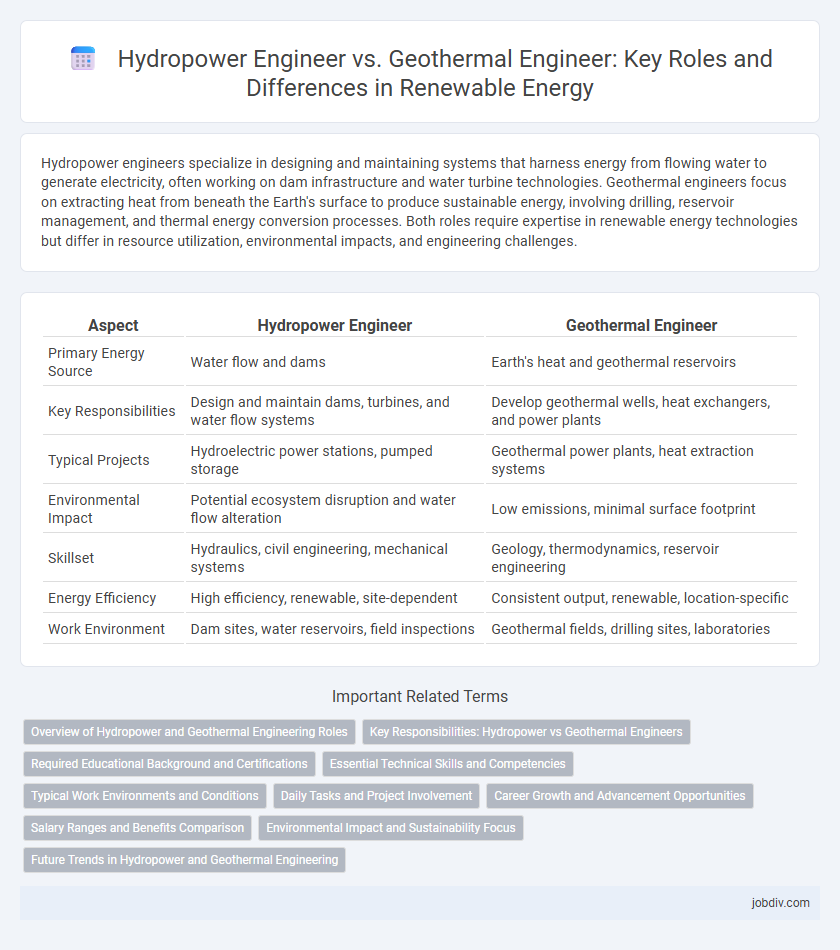Hydropower engineers specialize in designing and maintaining systems that harness energy from flowing water to generate electricity, often working on dam infrastructure and water turbine technologies. Geothermal engineers focus on extracting heat from beneath the Earth's surface to produce sustainable energy, involving drilling, reservoir management, and thermal energy conversion processes. Both roles require expertise in renewable energy technologies but differ in resource utilization, environmental impacts, and engineering challenges.
Table of Comparison
| Aspect | Hydropower Engineer | Geothermal Engineer |
|---|---|---|
| Primary Energy Source | Water flow and dams | Earth's heat and geothermal reservoirs |
| Key Responsibilities | Design and maintain dams, turbines, and water flow systems | Develop geothermal wells, heat exchangers, and power plants |
| Typical Projects | Hydroelectric power stations, pumped storage | Geothermal power plants, heat extraction systems |
| Environmental Impact | Potential ecosystem disruption and water flow alteration | Low emissions, minimal surface footprint |
| Skillset | Hydraulics, civil engineering, mechanical systems | Geology, thermodynamics, reservoir engineering |
| Energy Efficiency | High efficiency, renewable, site-dependent | Consistent output, renewable, location-specific |
| Work Environment | Dam sites, water reservoirs, field inspections | Geothermal fields, drilling sites, laboratories |
Overview of Hydropower and Geothermal Engineering Roles
Hydropower engineers design, develop, and maintain systems that convert water flow into electrical energy, focusing on dam construction, turbine technology, and environmental impact assessment. Geothermal engineers specialize in harnessing heat from the Earth's interior, working on drilling, reservoir management, and sustainable energy extraction techniques. Both roles require expertise in renewable energy systems but differ in resource management, where hydropower relies on water resources and geothermal engineering depends on subsurface thermal energy.
Key Responsibilities: Hydropower vs Geothermal Engineers
Hydropower engineers focus on designing and maintaining systems that harness energy from flowing water, including dams, turbines, and generators, ensuring efficient conversion of kinetic energy into electricity. Geothermal engineers specialize in the exploration, drilling, and management of geothermal reservoirs, optimizing heat extraction for sustainable power generation and heating applications. Both roles require expertise in resource assessment and system optimization but differ in their focus on water-based energy versus earth's internal heat sources.
Required Educational Background and Certifications
Hydropower engineers typically require a bachelor's degree in civil, mechanical, or environmental engineering, with certifications such as the Professional Engineer (PE) license enhancing career prospects. Geothermal engineers often hold degrees in mechanical, chemical, or geothermal engineering, and may obtain certifications like the Geothermal Energy Professional (GEP) credential to demonstrate specialized expertise. Both roles benefit from advanced knowledge in renewable energy technologies, fluid dynamics, and project management certifications to optimize plant design and operational efficiency.
Essential Technical Skills and Competencies
Hydropower engineers require expertise in fluid mechanics, turbine design, and hydraulic system analysis to optimize water flow for energy generation, while geothermal engineers focus on thermodynamics, geothermal reservoir management, and heat transfer processes to efficiently harness subsurface heat. Both roles demand proficiency in project management, environmental impact assessment, and the use of specialized modeling software for site analysis and system simulation. Strong analytical skills, knowledge of renewable energy regulations, and experience with geotechnical instrumentation are critical for successful design and implementation in hydropower and geothermal projects respectively.
Typical Work Environments and Conditions
Hydropower engineers typically work in hydroelectric power plants, dams, and river sites, often facing outdoor environments with exposure to water, weather variations, and heavy machinery. Geothermal engineers operate in geothermal fields, power plants, and drilling sites, dealing with high-temperature steam, underground heat sources, and remote, rugged terrains. Both professions require adapting to field conditions, but hydropower engineers focus on water flow and structural elements, while geothermal engineers manage subsurface thermal resources and drilling operations.
Daily Tasks and Project Involvement
Hydropower engineers primarily design and maintain water-based energy systems, focusing on dam safety assessments, turbine efficiency optimization, and water flow management. Geothermal engineers specialize in harnessing Earth's heat by overseeing geothermal resource exploration, well drilling operations, and heat extraction system maintenance. Project involvement for hydropower often includes large infrastructure development and environmental impact studies, while geothermal projects emphasize subsurface modeling and sustainable heat extraction techniques.
Career Growth and Advancement Opportunities
Hydropower engineers benefit from a well-established sector with steady global investments in renewable energy infrastructure, offering diverse project opportunities and leadership roles in dam design and hydroelectric power plant operations. Geothermal engineers experience rapid career growth driven by increasing demand for sustainable baseload energy, particularly in regions with high geothermal activity, leading to advancements in resource assessment, drilling technologies, and plant optimization. Both fields provide strong career advancement, but geothermal engineering holds potential for innovative breakthroughs and expanding markets in emerging economies.
Salary Ranges and Benefits Comparison
Hydropower engineers typically earn between $70,000 and $120,000 annually, with benefits including health insurance, retirement plans, and project bonuses, reflecting the field's reliance on large-scale infrastructure projects. Geothermal engineers often have salary ranges from $75,000 to $130,000, benefiting from incentives related to renewable energy grants, green energy tax credits, and opportunities in emerging sustainable markets. Salary and benefits vary based on experience, location, and employer but geothermal roles may offer additional financial perks due to the growing investment in clean energy technologies.
Environmental Impact and Sustainability Focus
Hydropower engineers design systems that harness river and dam flows to generate electricity, with environmental impacts including fish habitat disruption and changes to water quality. Geothermal engineers develop technology to extract underground heat, often producing lower emissions and requiring careful management of land and water use to maintain sustainability. Both disciplines emphasize renewable energy solutions but differ in localized ecological effects and resource management strategies critical to long-term environmental health.
Future Trends in Hydropower and Geothermal Engineering
Future trends in hydropower engineering emphasize the integration of advanced turbine technology and digital monitoring systems to enhance efficiency and environmental sustainability. Geothermal engineering is progressing towards enhanced geothermal systems (EGS) and hybrid energy solutions that maximize heat extraction and reduce carbon footprints. Both fields prioritize innovations that support renewable energy targets and grid resilience amid growing global energy demands.
Hydropower Engineer vs Geothermal Engineer Infographic

 jobdiv.com
jobdiv.com